Related Research Articles

Gabon, officially the Gabonese Republic, is a country on the Atlantic coast of West Central Africa. Located on the equator, it is bordered by Equatorial Guinea to the northwest, Cameroon to the north, the Republic of the Congo on the east and south, and the Gulf of Guinea to the west. It has an area of nearly 270,000 square kilometres (100,000 sq mi) and its population is estimated at 2.3 million people. There are coastal plains, mountains, and a savanna in the east. Libreville is the country's capital and the largest city.
Little is known of the history of Gabon prior to European contact. Bantu migrants settled the area beginning in the 14th century. Portuguese explorers and traders arrived in the area in the late 15th century. The coast subsequently became a center of the transatlantic slave trade with European slave traders arriving to the region in the 16th century. In 1839 and 1841, France established a protectorate over the coast. In 1849, captives released from a captured slave ship founded Libreville. In 1862–1887, France expanded its control including the interior of the state, and took full sovereignty. In 1910 Gabon became part of French Equatorial Africa and in 1960, Gabon became independent.

Pascal Lissouba was a Congolese politician who was the first democratically elected President of the Republic of the Congo and served from 31 August 1992 until 25 October 1997. He was overthrown by the former and current President Denis Sassou Nguesso in the 1997 civil war.
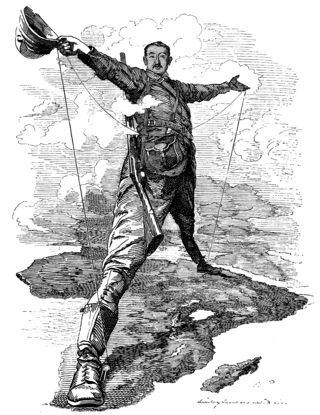
The Scramble for Africa is a term widely used by historians to describe the invasion, annexation, division, and colonization of most of Africa by seven Western European powers during an era known as "New Imperialism". The 10 percent of Africa that was under formal European control in 1870 increased to almost 90 percent by 1914, with only Liberia and Ethiopia remaining independent.
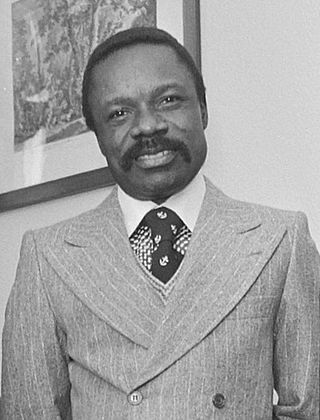
Omar Bongo Ondimba was a Gabonese politician who was the second president of Gabon for almost 42 years, from 1967 until his death in 2009. Bongo was promoted to key positions as a young official under Gabon's first President Léon M'ba in the 1960s, before being elected vice-president in his own right in 1966. In 1967, he succeeded M'ba to become the country's second president, upon the latter's death.

Gabriel Léon M'ba was a Gabonese politician who served as both the first Prime Minister (1959–1961) and President (1961–1967) of Gabon.
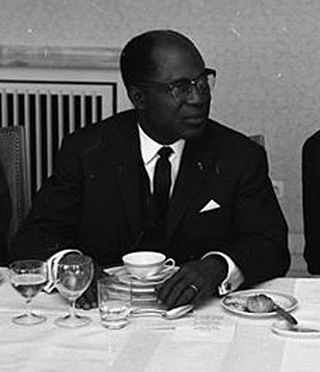
Jean-Hilaire Aubame was a Gabonese politician active during both the colonial and independence periods. The French journalist Pierre Péan said that Aubame's training "as a practicing Catholic and a customs official helped to make him an integrated man, one of whom political power was not an end in itself."
In current political-science and international-relations theory, a rentier state is a state which derives all or a substantial portion of its national revenues from the rent paid by foreign individuals, concerns or governments.
The resource curse, also known as the paradox of plenty or the poverty paradox, is the phenomenon of countries with an abundance of natural resources having less economic growth, less democracy, or worse development outcomes than countries with fewer natural resources. There are many theories and much academic debate about the reasons for and exceptions to the adverse outcomes. Most experts believe the resource curse is not universal or inevitable but affects certain types of countries or regions under certain conditions.

Moanda is one of the largest towns in Gabon, lying on the N3 road in Haut Ogooué. It is also one of the most important manganese mining towns in the world, under the auspices of the Compagnie Minière de l'Ogooué (COMILOG), which began mining in 1957. Moanda has a population of around 39,298 inhabitants and is the second largest city in the Haut Ogooué Region, after Franceville. It is also a border town, lying 100 km away from the border with the Republic of Congo.
Lébamba is a small town in south-western Gabon. It is the capital of Louetsi-Wano Department in Ngounié Province. It lies along the N6 road, 38.3 kilometres northeast of Ndendé. A Catholic Mission has long been established in Lébamba.
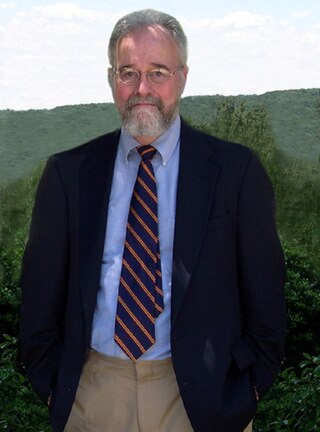
William Courtney Dowling is University Distinguished Professor of English and American Literature emeritus at Rutgers University in New Brunswick, New Jersey, specializing in 18th-century English literature, literature of the early American Republic, and Literary Theory.
Marc Saturnin Nan Nguéma was a Gabonese economist and politician. He was the secretary-general of the Organization of the Petroleum Exporting Countries (OPEC) from 1981 to 1983 and was an opposition politician in Gabon from 1990 till his death.
The Kingdom of Orungu was a small, pre-colonial state of what is now Gabon in Central Africa. Through its control of the slave trade in the 18th and 19th centuries, it was able to become the most powerful of the trading centers that developed in Gabon during that period.

Franco-Gabonese relations are the current and historical relations between France and Gabon. Both nations are members of the Organisation internationale de la Francophonie and the United Nations.
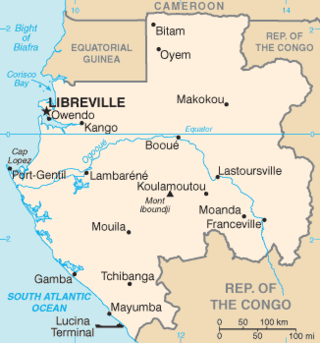
The 1964 Gabonese coup d'état was staged between 17 and 18 February 1964 by Gabonese military officers who rose against Gabonese President Léon M'ba. Before the coup, Gabon was seen as one of the most politically stable countries in Africa. The coup resulted from M'ba's dissolution of the Gabonese legislature on 21 January 1964, and during a takeover with few casualties 150 coup plotters arrested M'ba and a number of his government officials. Through Radio Libreville, they asked the people of Gabon to remain calm and assured them that the country's pro-France foreign policy would remain unchanged. A provisional government was formed, and the coup's leaders installed Deputy Jean-Hilaire Aubame, who was M'ba's primary political opponent and had been uninvolved in the coup, as president. Meanwhile, M'ba was sent to Lambaréné, 250 kilometres (155 mi) from Libreville. There was no major uprising or reaction by the Gabonese people when they received word of the coup, which the military interpreted as a sign of approval.

Paul Marie Indjendjet Gondjout was a Gabonese politician and civil servant, and the father of Laure Gondjout, another prominent Gabonese politician. Gondjout was a member of the Mpongwe ethnic group, and served in the French colonial administration from 1928, and founded the Cercle amical et mutualiste des évolués de Port-Gentil in 1943. He was a delegate to the French Senate from 1949 to 1958, and founded the Gabonese Democratic Bloc (BDG). In 1954, Léon M'ba joined the party and eventually overthrew Gondjout as leader.
Radio Libreville is a radio station based in Libreville, Gabon's capital. The station played an important role politically in Gabon throughout the 1960s and 1970s and was the state's communication system to the nation.
The cinema of Gabon has had an uneven history. Though President Omar Bongo and his wife, Josephine Bongo, encouraged filmmaking in the 1970s, there was a 20-year hiatus until filmmaking started to grow again in the new millennium.

Gabonese nationality law is regulated by the Constitution of Gabon, as amended; the Gabonese Nationality Code, and its revisions; and various international agreements to which the country is a signatory. These laws determine who is, or is eligible to be, a national of Gabon. The legal means to acquire nationality, formal legal membership in a nation, differ from the domestic relationship of rights and obligations between a national and the nation, known as citizenship. Nationality describes the relationship of an individual to the state under international law, whereas citizenship is the domestic relationship of an individual within the nation. Gabonese nationality is typically obtained under the principle of jus soli, i.e. by birth in Gabon, or of jus sanguinis, born to parents with Gabonese nationality. It can be granted to persons with an affiliation to the country, or to a permanent resident who has lived in the country for a given period of time through naturalization.
References
- "Douglas Yates, Ph.D." www.ags.edu. American Graduate School in Paris. Retrieved February 19, 2014.
- "Douglas Yates, Professor at the American University of Paris and Author of 'The Scramble for African Oil'". www.france24.com. France 24. Retrieved February 19, 2014.
- "The Scramble for African Oil: Oppression, Corruption, and War for Control of Africa's Natural Resources". www.foreignaffairs.com. Foreign Affairs. Retrieved February 19, 2014.